Wagner Die Meistersinger von Nürnberg opera to a libretto by the composer. Directed 2008 by Katharina Wagner at the Bayreuth Festspiele. Stars Franz Hawlata (Hans Sachs), Artur Korn (Veit Pogner), Charles Reid (Kunz Vogelgesang), Rainer Zaun (Konrad Nachtigal), Michael Volle (Sixtus Beckmesser), Markus Eiche (Fritz Kothner), Edward Randall (Balthasar Zorn), Hans-Jürgen Lazar (Ulrich Eisslinger), Stefan Heibach (Augustin Moser), Martin Snell (Hermann Ortel), Andreas Macco (Hans Schwarz), Diogenes Randes (Hans Foltz), Klaus Florian Vogt (Walther von Stolzing), Norbert Ernst (David), Michaela Kaune (Eva), Carola Guber (Magdalene), and Friedemann Röhlig (A nightwatchman). Sebastian Weigle conducts the Bayreuther Festspiele Orchestra and the Beyreuther Festspiele Chorus (Chorus Master Eberhard Friedrich; Music Supervisor Christoph Ulrich Meier). Stage design by Tilo Steffens; costume design by Michaela Barth and Tilo Steffens; lighting by Andreas Grüter; dramaturgy by Robert Sollich. Directed for TV by Andreas Morell. Released 2010, disc has 5.1 dts-HD Master Audio sound. Grade: B
Medea
Aribert Reimann Medea opera to a libretto by the composer. Directed 2010 by Marco Arturo Marelli at the Wiener Staatsoper. Stars Marlis Petersen (Medea), Michaela Selinger (Kreusa), Elisabeth Kulman (Gora), Michael Roider (Kreon), Adrian Eröd (Jason), and Max Emanuel Cenic (Herold). Michael Boder conducts the Orchestra of the Wiener Staatsoper. Set & lighting design by Marco Arturo Marelli; costume design by Dagmar Niefind. Directed for TV by Peter Schröder. Released in 2011, has 5.1 dts-HD Master Audio sound. Grade: B-
Read MoreMartha Argerich & Mischa Maisky
Martha Argerich & Mischa Maisky concert. Argerich, Maisky, and the Lucerne Symphony perform:
Dvořák Scherzo capriccioso in D flat major
Shchedrin Romantic Offering (world premiere)
Franck Sonata for Cello and Piano in A Major
Shostakovich Symphony No. 9
Neeme Jarvi conducts the Luzerner Sinfonieorchester. Directed for TV by Michael Beyer. Released 2011, disc has 5.1 dts-HD Master Audio sound. Grade: B+
Marriage of Figaro
Mozart Marriage of Figaro (Le nozze di Figaro) opera to libretto by Lorenzo Da Ponte. Although titled in English, opera is sung in Italian. Directed 2010 by Neil Armfield (with Associate Director Roger Press) at the Sydney Opera House. Stars Teddy Tahu Rhodes (Figaro), Taryn Feibig (Susanna), Warwick Fyfe (Dr. Bartolo), Jacqueline Dark (Marcellina), Sian Pendry (Cherubino), Peter Coleman-Wright (Count Almaviva), Kanen Breen (Don Basilio), Rachelle Durkin (Countess Almaviva), Clifford Plumpton (Antonio), Claire Lyon (Barbarina), as well as Katherine Wiles and Margaret Plummer (Bridesmaids). Patrick Summers conducts the Australian Opera and Ballet Orchestra (Concertmaster Aubrey Murphy) and the Opera Australia Chorus (Chorus Master Michael Black with Assistant Anthony Hunt). Designs by Dale Ferguson; lighting by Rory Dempster. Directed for TV by Cameran Kirkpatrick. Released 2011, disc has 5.1 dts-HD Master Audio sound. Grade: NA
Maria Stuarda
B004GX91ZM
Read MoreMarco Polo
Tan Dun Marco Polo opera to libretto by Paul Griffiths. Directed 2008 by Pierre Audi at Het Muziektheater Amsterdam. Stars Charles Workman (Polo), Sarah Castle (Marco), Stephen Richardson (Kublai Khan), Nancy Allen Lundy (Water), Zhang Jun (Shadow 1/Rustichello/Li Po), Tania Kross (Shadow 2/Sheherazada/Mahler/Queen), Stephen Bryant (Shadow 3/Dante/Shakespeare), and Mu Na (Chinese/Arabian Dancer). Tan Dun himself conducts the Netherlands Chamber Orchestra and the Cappella Amsterdam (Chorus Master Daniel Reuss). Ya Dong plays pipa; Siddharth Kishna, sitar; Rupak Kumar Pandit, tabla. Set and lighting by Jean Kalman; costumes by Angelo Figus; choreography by Nanine Linning. Directed for TV by Misjel Vermerien. Released 2009, disc has 5.0 PCM sound. Grade: C
Read MoreMahler Symphonies No. 1-7
Mahler Symphonies No. 1-7. Claudio Abbado conducts the Lucerne Festival Orchestra. Released 2011, this is a box set of seven discs from EuroArts, Mahler Symphonies No. 1, 2, 3, 4, 5, 6, and 7. All of these titles have been previously released and reported on this website. See individual title stories for details.
Read MoreMahler Symphony No. 7
Mahler Symphony No. 6 "Tragic"
Mahler Symphony No. 2 "Resurrection"
Mahler Symphony No. 2 "Resurrection". Claudio Abbado in 2003 conducts the Lucerne Festival Orchestra & the Orfeón Donostiarra (Chorus Master José Antonio Sainz Alfaro). Soloists are soprano Eteri Gvazava and contralto Anna Larsson. Directed for TV by Michael Beyer. Released 2010, EuroArts claimed that the disc has 5.1 dts-HD Master Audio surround sound, but see comments below. Grade: D
Rienzi
Wagner Rienzi opera to libretto by the composer. Directed 2010 by Philipp Stölzl (with co-director Mara Kurotschka) at the Deutsche Oper Berlin. Stars Torsten Kerl (Rienzi), Camilla Nylund (Irene), Ante Jerkunica (Steffano Colonna), Kate Aldrich (Adriano), Krzysztof Szumanski (Paolo Orsini), Lenus Carlson (Cardinal Orvieto), Clemens Bieber (Baroncelli), Stephen Bronk (Cecco del Vecchio), and Gernot Frischling (Rienzi Stand-in). Sebastian Lang-Lessing conducts the Orchestra of the Deutsche Oper Berlin with the Chorus and Extra-Chorus of the Deutsche Oper Berlin (Chorus Master: William Spaulding). Stage design by Ulrike Siegrist and Philipp Stölzl; costume design by Kathi Maurer and Ursula Kudrna; video by Momme Hinrichs and Torge Møller of fettFilm. Directed for TV by Johannes Grebert. Released 2010, disc has 5.1 dts-HD Master Audio sound. Grade: B+
Read MoreThe Ring Without Words
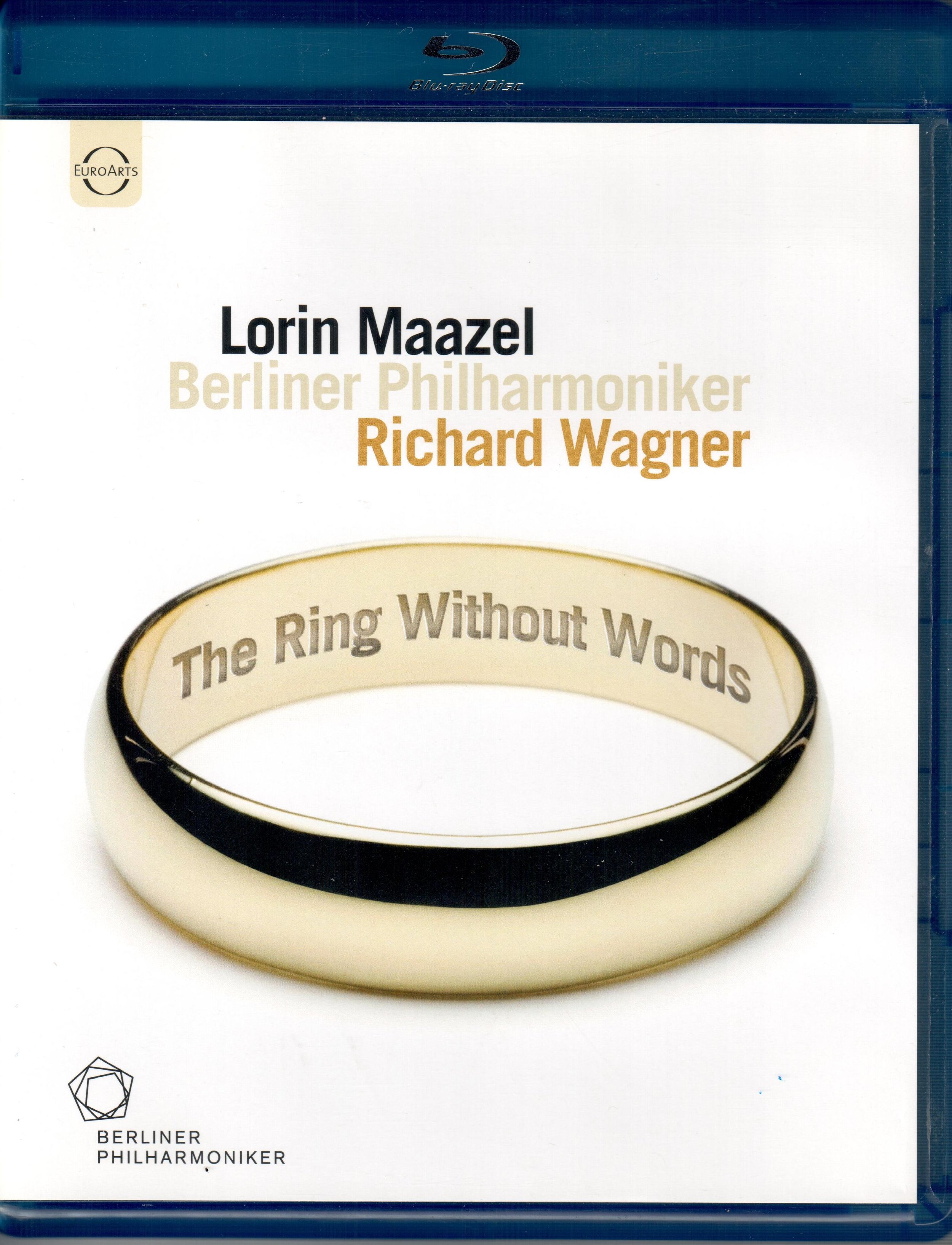
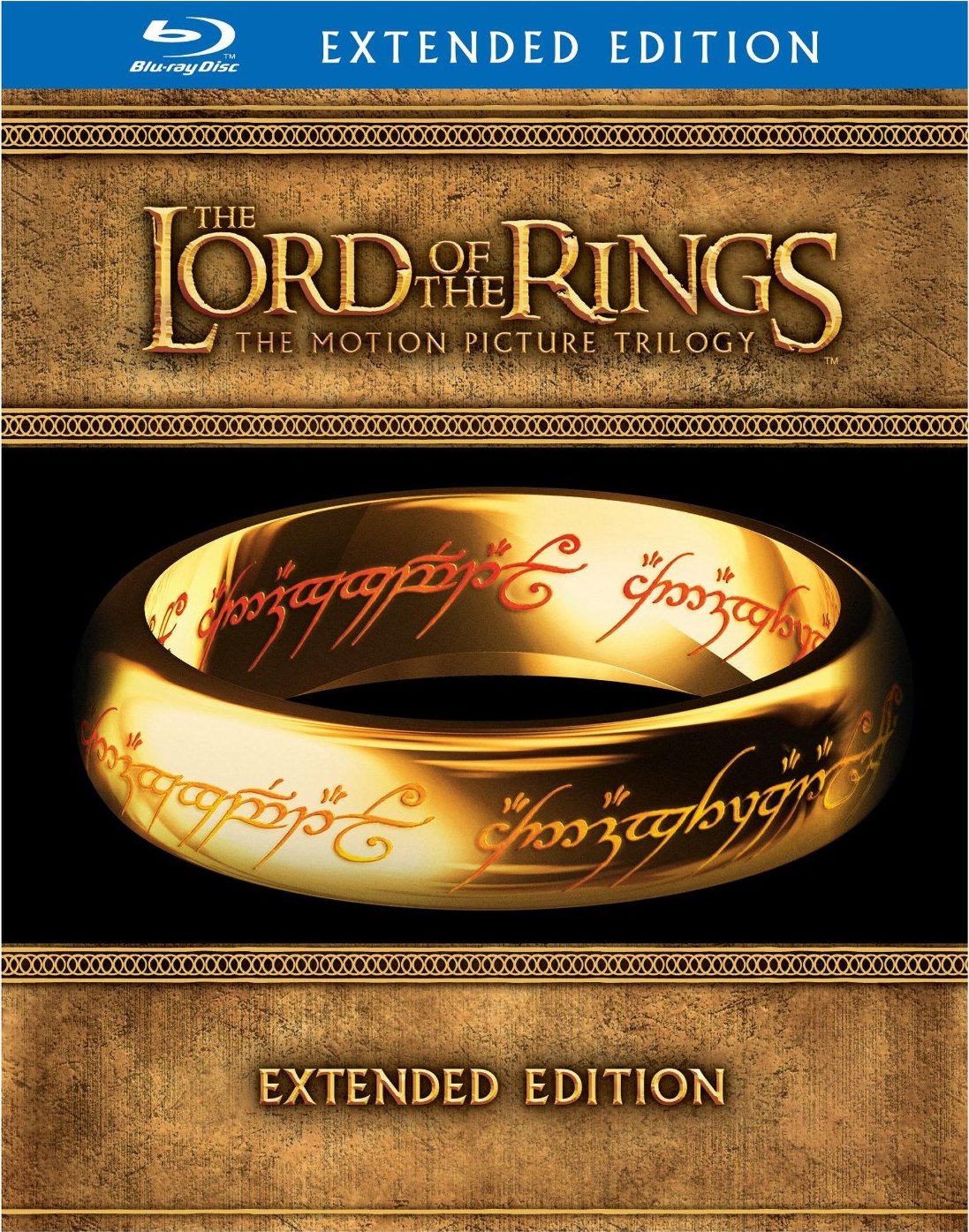
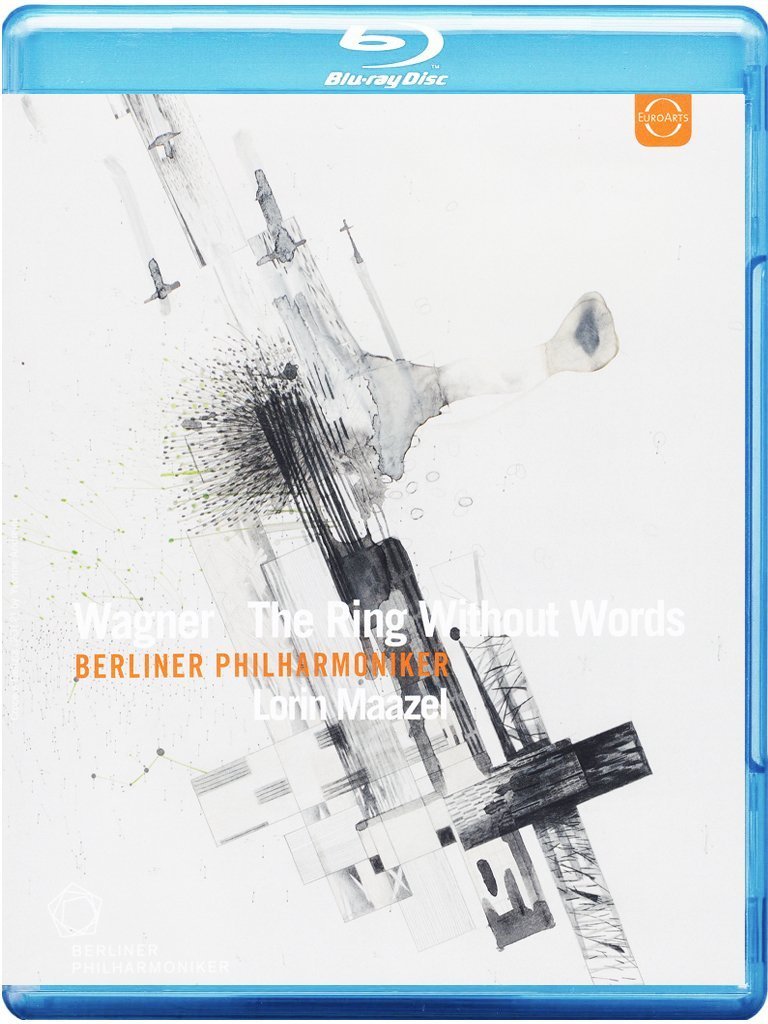
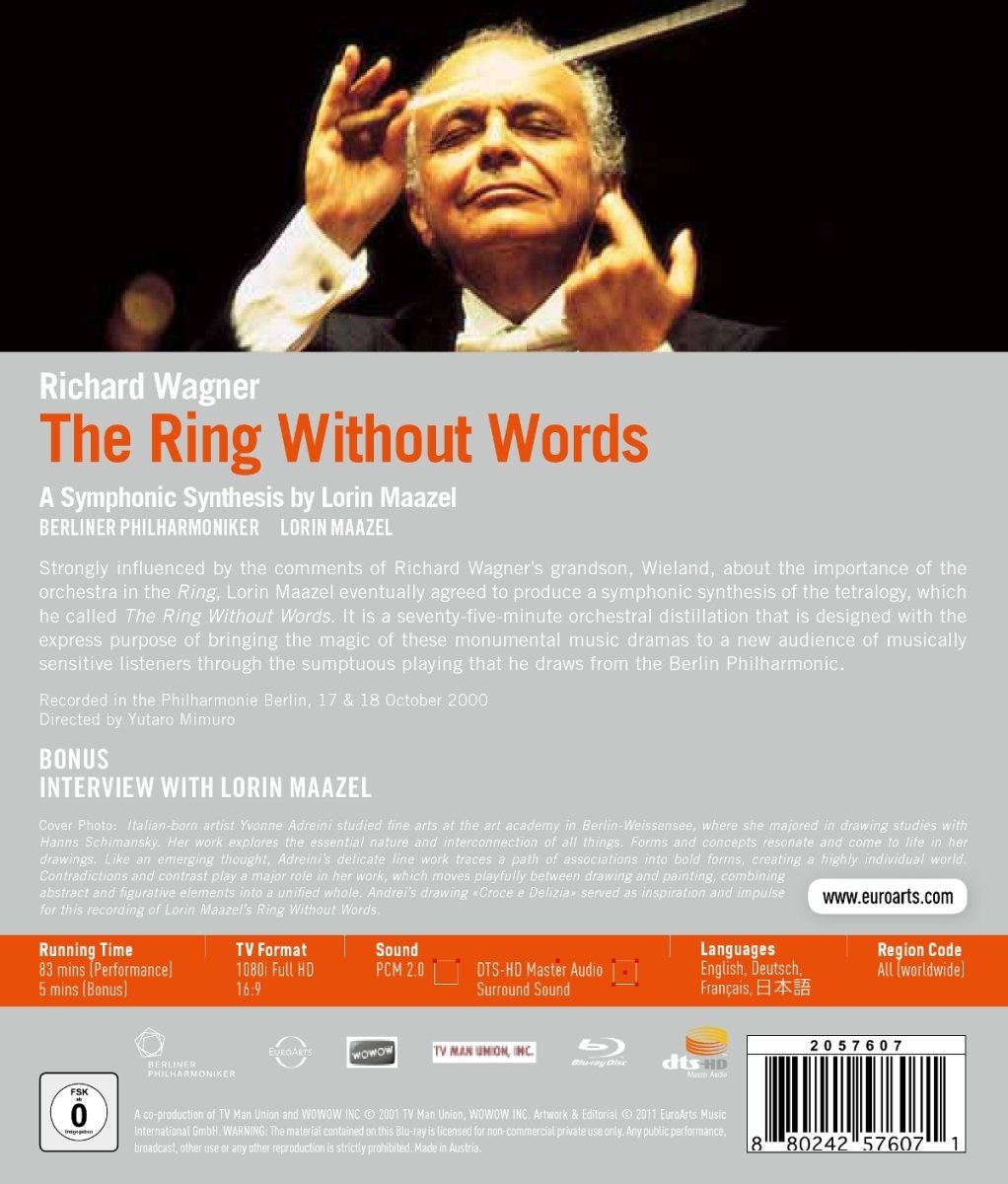
Wagner The Ring Without Words is an 83-minute long "symphonic synthesis" of selections from the orchestral music in the Ring cycle. This was arranged by Lorin Maazel, and Maazel recorded it with Berlin Philharmoniker. Released in 2012, disc has 5.1 dts-HD Master Audio sound. Grade: C
Lorin Maazel is one of the most experienced conductors in the world and also a composer. In 2000, Maazel was commissioned by Telarc to "edit" all of the Ring operas into a single orchestral piece that would provide a summary of the whole cycle in concert form for a symphony orchestra. This Maazel did by starting with the first note of Rheingold and ending with the last chord of Götterdämmerung. Along the way he added no music of his own. His contribution was to decide what to cut and where to "splice" the remaining music in a manner that would not sound jarring. Of course, no singing or staging was contemplated.
The idea was to present Wagner's core creation in a unified way (rather than just play a bunch of concert excerpts). This might be considered something of a gimmick. But the project apparently was successful. In 2000, Maazel recorded it with the Berlin Philharmoniker, and Telarc published this as a CD. According to Maazel (speaking in a bonus on subject disc) Telarc sold hundreds of thousands of CDs to folks who were a new audience for the Wagner Ring. Maazel’s synthesis was taken up by other orchestras like the Houston Symphony, which presented it in 2010.
Now guess what? Way back in 2000, Maazel and the Berlin Philharmoniker also made a video of The Ring Without Words. EuroArts got the rights to the video and published it in Blu-ray. From the artistic viewpoint, there can be no doubt that there is a market for the Ring without Words and that it can benefit many people as a video. Personally it reminds me of my passion for butter pecan ice cream. I just love butter pecan, but I don't want to eat a gallon of it in one hour. Ring without Words has most of the famous music and themes Wagner created in 4 long operas. The smashing together of so many dramatic musical ideas is efficient; but for me, it becomes tiresome.
Now lets turn our attention to the technical merits of the video. From the viewpoint of someone who has only experience with CDs, this video might be impressive. But from our perspective, the video is sadly obsolete. The video was probably state-of-the-art in 2000. But the picture today has an over-illuminated and faded look with unsaturated colors and a generally listless aura. The title has Master Audio output, but that's no help if, as here, the master recording is muddy and lacking in fidelity. And, oh, the players in the orchestra in 2000 looks so much younger then than they look now!
There has been confusion about the art work on the keepcase. The 1st of the 4 images in the slideshow above shows the original front cover. The 2nd image presents a problem. Who do you think has more lawyers: EuroArts or The Lord of the Rings? The 3rd image is the replacement cover art that's on the title now. The last image is the back-cover art, which is very similar to the original back art.
In summary, I don't think this year 2000 version of The Ring without Words will have much appeal to discerning HDVD fans. But a re-recording of the work per state-of-the-art of today might be a welcome addition to the catalog, that least for those who really love butter pecan.
OR
Romeo and Juliet
Shakespeare Romeo and Juliet play. Directed 2009 by Dominic Dromgoole at Shakespeare's Globe Theatre, London. Stars Adetomiwa Edun (Romeo), Ellie Kendrick (Juliet), Ukweli Roach (Tybalt), Philip Cumbus (Mercutio), Tom Stuart (Paris), Penny Layden (Nurse), Miranda Foster (Lady Capulet), Rawiri Paratene (Friar Lawrence), Andrew Vincent (Prince Escalus), Michael O'Hagan (Montague), Holly Atkins (Lady Montague), Jack Farthing (Benvolio/Quartet), Graham Vick (Abraham/Apothecary/Chorus/Quartet), Fergal McElherron (Balthazar/Peter/Gregory/Chorus/Quartet), Ian Redford (Capulet), James Lailey (Sampson/Friar and John/Constable/Chorus/Quartet). Citizens played by Lucy Conway, Jason Carter, Rhoda Ofori-Attah and Stevie Raine. Musicians are William Lyons, Arngeir Hauksson, Amy Kelly, Sharon Lindo, and Nicholas Perry. Designed by Simon Daw; music composed by Nigel Hess; choreographed by Siân Williams; fight director was Malcorm Ranson; musical director was William Liyons. Directed for TV by Kriss Russman; produced by Hans Petri. Released 2010, disc has 5.1 dts Master Audio sound. Grade: B+
Der Rosenkavalier
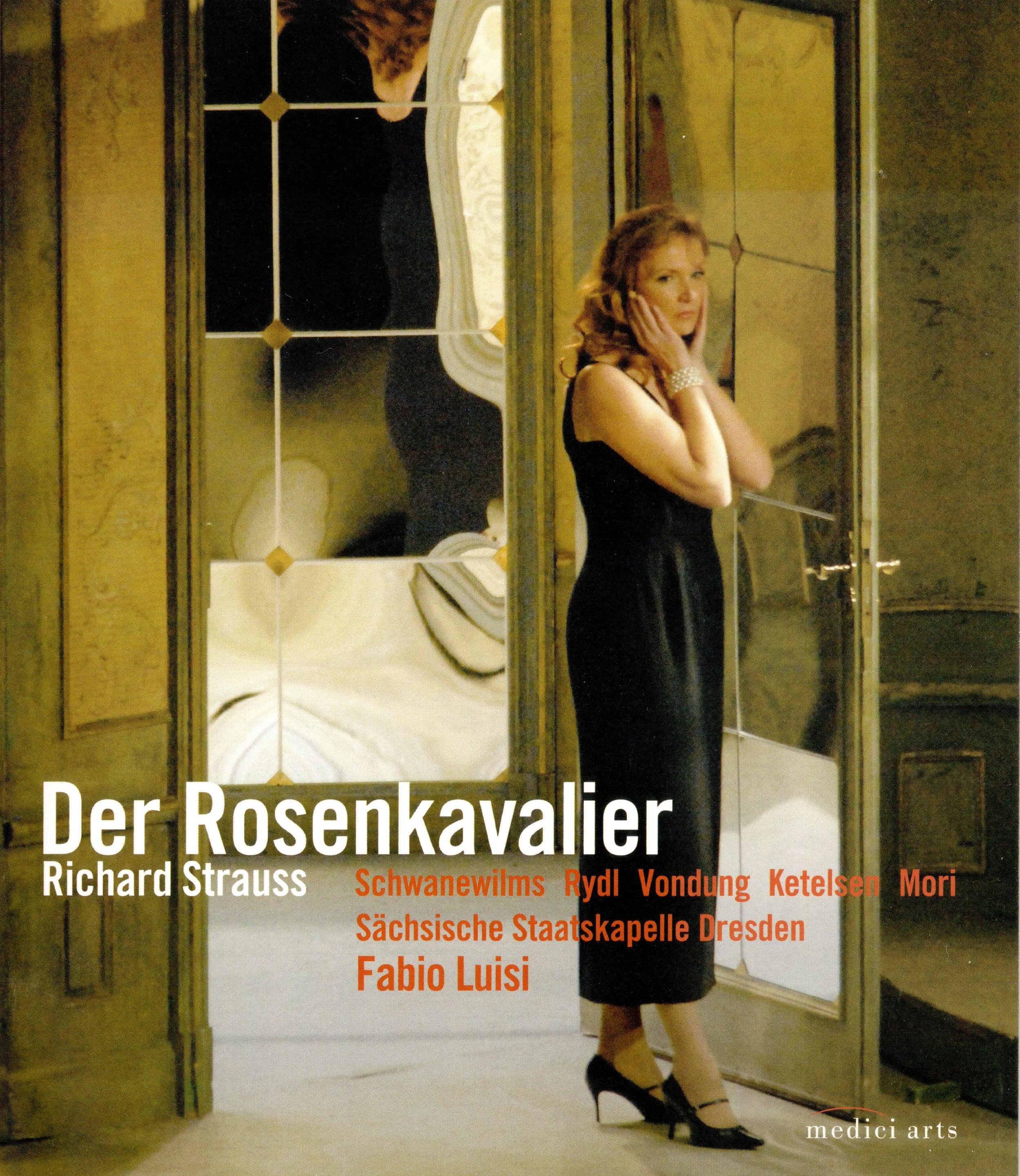
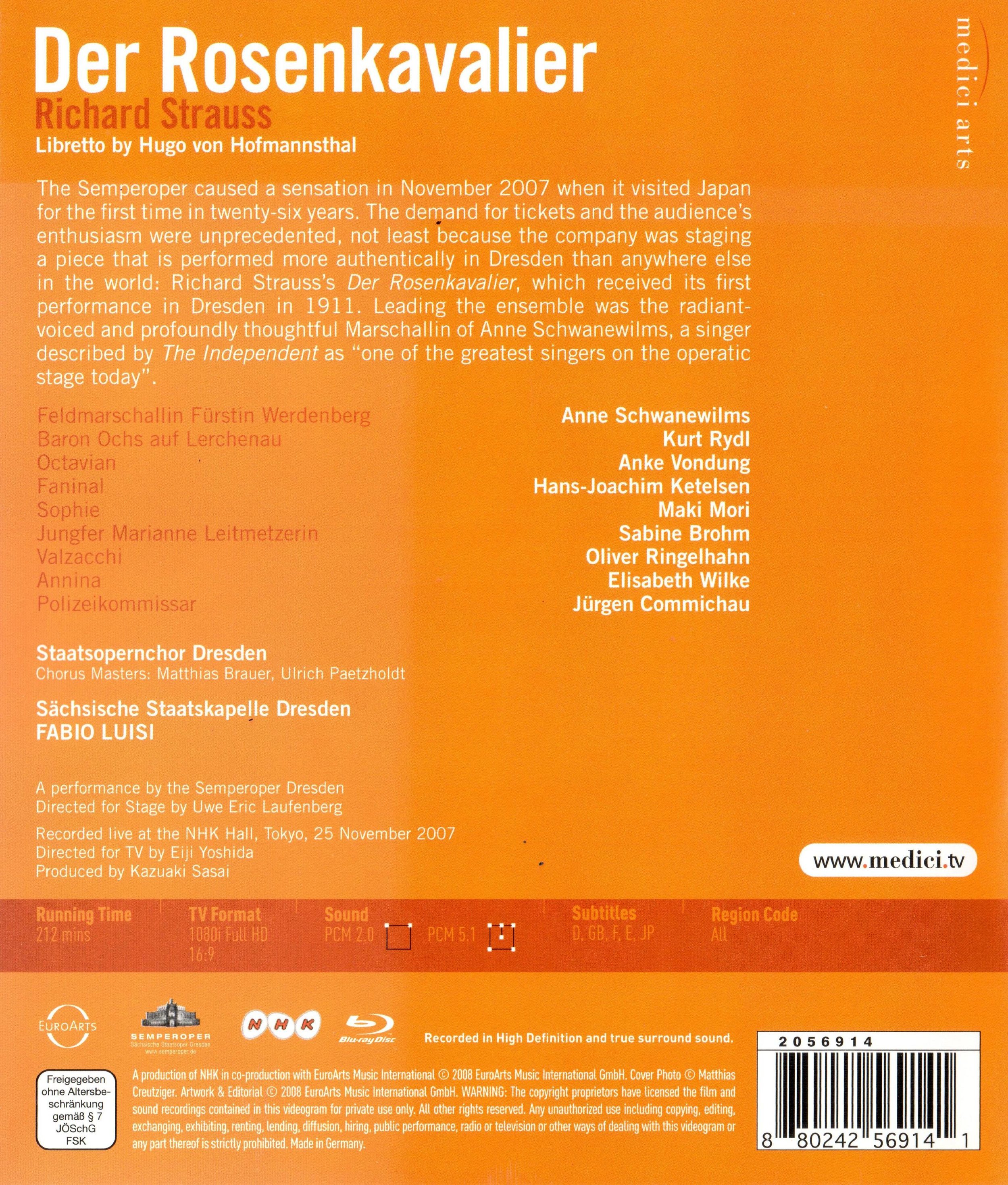
Richard Strauss Der Rosenkavalier opera to libretto by Hugo von Hofsmannsthal. Directed by Uwe Eric Laufenberg for the Semperoper Dresden. (The performance on this disc was recorded live in 2007 at the NHK Hall in Tokyo.) Stars Anna Schwanewilms (Feldmarschallin), Anke Vondung (Octavian), Hans-Joachim Ketelsen (Herr von Faninal), Maki Mori (Sophie), Kurt Rydl (Baron Ochs), Sabine Brohm (Marianne Leitmetzerin), Oliver Ringelhahn (Valzacchi), Elisabeth Wilke (Annina), Jürgen Commichau (Police Commissioner), Helmut Henschel (Marschallin's major domo), Gerald Hupach (Faninal's major domo), Matthias Heneberg (Notary), Tom Martinsen (Innkeeper), Roberto Saccà (Singer), Beate Siebert, Birgit Müller, Annett Eckert (Three noble orphans), Christiane Hossfeld (Milliner), Peter Küchler (Animal vendor), Ullrich Märker, Andreas Heinze, Ingolf Stollberg, Hans-Jürgen Staude (Four footmen), Naoki Espree Leopold (Mohammed), Dirk Wolter (Baron's son), Michael Wettin, Thomas Müller, Mirko Tuma, Werner Harke, Holger Steinert, Alexander Födisch (Baron's servants), Andreas Soika (Valet), Markus Hansel, Andreas Heinze, Klaus Milde, Andreas Burghardt (Four waiters), Gisela Pluskwik, Julia Brückner, Katharina Flade, and Min-Kyoung Kwon (Four little children). Fabio Luisi conducts the Sächsische Staatskappelle Dresden and the Staatsopernchor Dresden (Chorus Masters Matthias Brauer and Ulrich Paetzholdt). Stage design by Christoph Schubiger; costumes by Jessica Karge; lighting by Jan Seeger and Christoph Schmädicke. Directed for TV by Eiji Yoshida. Sung in German. Released 2008, disc has 5.1 PCM sound. Grade: A
Here's a report from Wonk Gordon Smith:
“Der Rosenkavalier has been my all-time favourite opera for many years, and I was curious to see how this first HDVD version would compare with those already issued on DVD. The Dresden State Opera (Semperoper) is highly qualified to present this work, since it was premiered there in 1911 to huge success. The performance immortalised on this disc was recorded by the Semperoper during it's 2007 tour of Japan.
In Act 1, we see the "mature" Marschallin ("Field Marshall's wife" sung by soprano Anne Schwanewilms) with her "toy boy" lover Octavian (sung by mezzo soprano Anke Vondung)—a pairing that is always deliciously ambiguous. (For those new to this opera, let me say that Octavian is a very young male character. The part is written in the mezzo range, so it's usually played by a woman.) This version is particularly delightful and, for me, even more successful than the iconic 1994 performance with Felicity Lott and Anne Sophie von Otter conducted by Carlos Kleiber. The necessity of this "trouser" role is, of course, that Octavian has to dress up as a maid to avoid being discovered in the Marschallin's bedroom by her lusty kinsman, Baron Ochs. The Baron has to find the "maid" sufficiently alluring to want to add her to his long list of conquests. In this version, Kurt Rydl could be accused of overplaying the Baron as a leery, lecherous caricature. But his rudeness contrasts with and gives greater depth to the sublime performances delivered by Anne Schwanewilms and Anke Wondung.
In Act 2, Octavian is chosen as the messenger for Baron Ochs to bring the silver rose to Sophie (sung by Japanese soprano Maki Mori), a 15-year old, admirably proper girl, as a formal marriage proposal from the Baron. When it comes to "the sublime", there can be very few moments in any opera, or in any other performance of this opera, to surpass the duets of Octavian and Sophie in this recording. In an appropriately "palatial" setting, Maki Mori's light soprano weaves and blends magically with Anke Vondung's mezzo as they discover the powerful attraction that draws them together in love at first sight. This produces something so wonderful that it makes you weep. Once again there is a stark contrast between this moment of ineffable beauty and the harsh reality of the Baron's earthy vulgarity and Sophie's shock at meeting her "intended" for the first time.
In Act 3, Octavian—once again disguised as the maid—tries to defend Sophie by drawing the Baron into a trap that will reveal his true nature. This brisk scene, full of weird and wonderful tricks and clever staging, leads to the reappearance of the Marschallin. She bows to the inevitable and, in a final moment of exquisite beauty, "releases" Octavian to pursue his true destiny with the young and radiant Sophie.
This EuroArts disc is one of the most moving opera performances I have ever seen on screen or in the opera house. The crispness of the Blu-ray images, the sensitive video editing, and the sumptuous recording of the Richard Strauss score combine to make a powerful case for HDVD being the ultimate way of enjoying opera. Can such superlative productions really be "better than being there"? The jury may be still out on that one. But they should certainly see this Rosenkavalier before delivering their verdict!”
Der Rosenkavalier
Richard Strauss Der Rosenkavalier opera to libretto by Hugo von Hofmannsthal. Directed 2009 by Herbert Wernicke at Baden-Baden. Stars Renée Fleming (Feldmarschallin), Franz Hawlata (Baron Ochs), Sophie Koch (Octavia), Franz Grundheber (Herr von Faninal), Diana Damrau (Sophie), Irmgard Vilsmaier (Marianne Leitmetzerin), Wolfgang Ablinger-Sperrhacke (Valzacchi), Jane Henschel (Annina), Jonas Kaufmann (Singer), Uli Kirsch (Pierrot), Andreas Hörl (Police Commissioner), Wilfried Gahmlich (Feldmarschallin's majordomo), Lynton Black (Notary), Jörg Schneider (Faninal's majordomo/innkeeper/animal vendor), Bernarda Bobro (Milliner), Catherine Veillerobe, Angela Rudolf, Nina Amon (Three noble orphans), Michael Schwendinger (Porter), Manfred Schwaiger (Impresario), Ilker Arcayürek, Jens Waldig, Manfred Hanakam, Michael Schwendinger (Four footmen), Ilker Arcayürek, Manfred Hanakam, Jörg Espenkott, Max Sahlinger (Four waiters), Andreas Maurer, Manfred Schwaiger, Jörg Espenkott, Christian Lusser, Michael Schwendinger, Kiril Chobanov, Akos Banlaky, Jens Waldig (Eight Lerchenauer retainers) and René Schumann (Leopold). Christian Thielemann conducts the Munich Philharmonic Orchestra, the Philharmonia Chor Wien (Chorus Director Walter Zeh), and the Theaterkinderchor am Helmholtz-Gymnasium Karlsruhe (Chorus Director Waltraud Kutz). Sets and costumes by Herbert Wernicke; lighting by Werner Breitenfelder. Directed for TV by Brian Large. Released 2009, disc has 5.1 dts-HD Master Audio sound. Grade: NA
